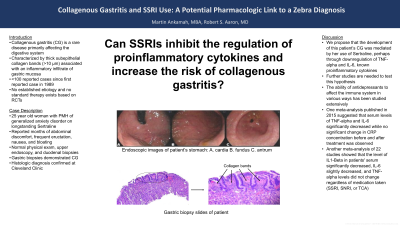Back


Poster Session D - Tuesday Morning
Category: Stomach
D0716 - Collagenous Gastritis in a Young, Healthy Patient on an SSRI: A Potential Pharmacologic Link to a Zebra Diagnosis
Tuesday, October 25, 2022
10:00 AM – 12:00 PM ET
Location: Crown Ballroom

Has Audio

Martin Ankamah, MBA
University of St. Thomas
Houston, TX
Presenting Author(s)
Martin Ankamah, MBA1, Robert Aaron, MD2
1University of St. Thomas, Houston, TX; 2Allied Digestive Health, Freehold, NJ
Introduction: Collagenous gastritis is a rare disease primarily affecting the digestive system characterized by thick subepithelial collagen bands ( >10 μm) associated with an inflammatory infiltrate of the gastric mucosa. Since it was first reported in 1989, less than 100 cases have been documented in English literature. With fewer than 100 reported cases and no established etiology, no standard therapy exists based on randomized, controlled clinical trials. The objective of this case report is to add to the current knowledge on collagenous gastritis by proposing the need for further work to evaluate a potential pharmacologic link between SSRI use and the disease.
Case Description/Methods: A healthy 25 year old woman a past medical history of generalized anxiety disorder (on longstanding Sertraline) presented for evaluation of several months of generalized abdominal discomfort, frequent eructation, nausea, and bloating. She denied any other gastrointestinal symptoms. The only medication she took regularly was Sertraline 25 mg daily, which she reported taking for at least a year. She did not take nSAIDs, herbal supplements, or vitamins.
Physical examination was benign. CBC, CMP, and thyroid function were normal. Serological screening for celiac disease was negative.
Upper endoscopy demonstrated a normal appearing esophagus, stomach, and small intestine. Biopsies were taken from the antrum, body, and second portion of the duodenum. Gastric biopsies demonstrated collagenous gastritis without evidence of intestinal metaplasia or H. pylori. Duodenal biopsies were normal. The histologic diagnosis was confirmed at Cleveland Clinic.
Discussion: The ability of antidepressants to affect the immune system in various ways has been studied extensively. For example, one meta-analysis published in 2015 suggested that serum levels of TNF-alpha and IL-6 significantly decreased while no significant change in CRP concentration before and after treatment was observed. Another meta-analysis of 22 studies showed that the level of IL1-Beta in patient's serum significantly decreased, IL-6 slightly decreased, TNF-alpha levels did not change regardless of taken medication (SSRI, SNRI, or TCA). We propose that the development of this patient's collagenous gastritis was mediated by her use of sertraline, perhaps through downregulation of TNF-alpha and IL-6, known proinflammatory cytokines. Further studies are needed to test this hypothesis.

Disclosures:
Martin Ankamah, MBA1, Robert Aaron, MD2. D0716 - Collagenous Gastritis in a Young, Healthy Patient on an SSRI: A Potential Pharmacologic Link to a Zebra Diagnosis, ACG 2022 Annual Scientific Meeting Abstracts. Charlotte, NC: American College of Gastroenterology.
1University of St. Thomas, Houston, TX; 2Allied Digestive Health, Freehold, NJ
Introduction: Collagenous gastritis is a rare disease primarily affecting the digestive system characterized by thick subepithelial collagen bands ( >10 μm) associated with an inflammatory infiltrate of the gastric mucosa. Since it was first reported in 1989, less than 100 cases have been documented in English literature. With fewer than 100 reported cases and no established etiology, no standard therapy exists based on randomized, controlled clinical trials. The objective of this case report is to add to the current knowledge on collagenous gastritis by proposing the need for further work to evaluate a potential pharmacologic link between SSRI use and the disease.
Case Description/Methods: A healthy 25 year old woman a past medical history of generalized anxiety disorder (on longstanding Sertraline) presented for evaluation of several months of generalized abdominal discomfort, frequent eructation, nausea, and bloating. She denied any other gastrointestinal symptoms. The only medication she took regularly was Sertraline 25 mg daily, which she reported taking for at least a year. She did not take nSAIDs, herbal supplements, or vitamins.
Physical examination was benign. CBC, CMP, and thyroid function were normal. Serological screening for celiac disease was negative.
Upper endoscopy demonstrated a normal appearing esophagus, stomach, and small intestine. Biopsies were taken from the antrum, body, and second portion of the duodenum. Gastric biopsies demonstrated collagenous gastritis without evidence of intestinal metaplasia or H. pylori. Duodenal biopsies were normal. The histologic diagnosis was confirmed at Cleveland Clinic.
Discussion: The ability of antidepressants to affect the immune system in various ways has been studied extensively. For example, one meta-analysis published in 2015 suggested that serum levels of TNF-alpha and IL-6 significantly decreased while no significant change in CRP concentration before and after treatment was observed. Another meta-analysis of 22 studies showed that the level of IL1-Beta in patient's serum significantly decreased, IL-6 slightly decreased, TNF-alpha levels did not change regardless of taken medication (SSRI, SNRI, or TCA). We propose that the development of this patient's collagenous gastritis was mediated by her use of sertraline, perhaps through downregulation of TNF-alpha and IL-6, known proinflammatory cytokines. Further studies are needed to test this hypothesis.

Figure: Actual endoscopic images of patient’s stomach: A. cardia B. fundus C. antrum
Disclosures:
Martin Ankamah indicated no relevant financial relationships.
Robert Aaron indicated no relevant financial relationships.
Martin Ankamah, MBA1, Robert Aaron, MD2. D0716 - Collagenous Gastritis in a Young, Healthy Patient on an SSRI: A Potential Pharmacologic Link to a Zebra Diagnosis, ACG 2022 Annual Scientific Meeting Abstracts. Charlotte, NC: American College of Gastroenterology.
